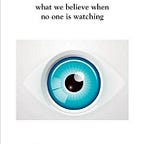A Penny For Your Thoughts
“Imagine you’re sitting in a train looking out the window. Report what you see, in whatever order you see it; from cabbages to kings, no matter how nonsensical, no matter how strange or embarrassing, without fear of censure.”
Thus Freud, shortly before the turn of the twentieth century, introduced his revolutionary method: free association, (after which, according to psychoanalyst Christopher Bollas, human thought would never be looked upon in the same way again.)
The door had been opened to an expanded, hierarchical sense of a layered consciousness; with room for a subconscious; pre-conscious; super-ego; split-consciousness; multiple consciousness; evolutionary consciousness; behavioral consciousness; neural unconsciousness; cognitive unconsciousness; affective unconsciousness. Over time, psychoanalysis, the cornerstone of all these pluralistic forms of the unconscious, would give way to the contemporary umbrella concept of the psychodynamic mind.
Following that, of all the philosophies, — I consider existentialism in its purest form- the dignity of human choice, in its fullest, most nurturing and inclusive sense (i.e. non political sense) which makes it almost anti-Sartrean, to be the most humane, pluralistic philosophy.
I believe that politics- the attempt to manipulate human bias in order to ratify essentially narcissistic self-interest by clothing it in click-bait shibboleths, such as public-service and ‘for their own good’, ‘for the good of the people’ — is among the most fleecy of all human endeavors. (It deserves the almost universal contempt in which it is held.)
But here is a question: how do you sustain interest in a relationship- largely non-reciprocal and imaginary? Classic example:
“I’m sorry that (a loved one) passed away.”
“Thank you.”
How does one continue to empathize, when, typically, the other does not feel comfortable (and neither do you)? How do you continue without feeling like you’re coming across as condescending or presumptuous?
On the other hand, as a result of this, I believe that the greatest and deepest challenge to theology is theodicy: the problem of evil — how can a being that is all powerful, omniscient and benevolent ever allow (or be in any way possible complicitous with) a ubiquitous cruelty and meaningless suffering in the world?
It is easy to say that kindness is the answer, but how to empower kindness so that it makes a nurturing impact on others, not the power of acquisition of desirable, trendy, materialistic goods of control, of domination, of self-weaponization.
One of the positive aspects of being kind is that one is not afraid of the other. RD Laing once commented that you can’t make progress or get close if you’re afraid of your patients, you have no chance of connecting with them.
Every therapist knows that well-timed dosages of empathic kindness have an almost magical, immediate, salutary effect on the patient. By reducing the habitual internal space between self and other (which shows up early in infants as stranger anxiety) it opens the door to the possibility of connection. The flip side is that once the defenses are loosened, and the door is opened, there is always a possibility that more comes in than you wanted. In other words, by creating space in your mind for connection you’re simultaneously creating space for an attack on your now increased vulnerability. Hence the internal ambiguity, an anxiety about the self’s borders; internal and external. Where do you place them? How can you trust them? What are the warning signs when they’re about to be breached (e.g. Hamas Israel). How do you determine in advance, how rigid or porous to make them? Whom do you trust? How do you learn how to read people in order to detect their hidden agendas?
Again, on the flip side (the positive side) when is the right time, the opportune time — to try to circumvent the habitual defenses of the other — in order to get closer to someone that you find interesting? How do you decide if the always lurking risk of rejection is worth it?
The fact that there is no crystal ball — to warn you off the wrong person, to encourage you to be open to the right person — makes the pursuit of any new connection a dicey affair. As a therapist, it is a sad truism that every toxic relationship a person has ever found themselves in has been the result of, among other things, making a hideously wrong decision
about when to let go, when to hold on to a dangerously unstable connection.
Learning how to speak your mind to articulate your deepest feelings — if only in your own mind — can be an important tool
in making viable interpersonal decisions. There is no better guide — for deciding whom to trust and whom not to trust — than your own past feelings.
So how do you decide what you think, what you truly feel — when (as the late David Foster Wallace famously put it “we live in a time when 5000 pieces of information are thrown at you every minute!).
Compounding the problem is that we live in a post-truth age, a time when what we call reality is up for grabs and it gets harder and harder to find meaningful common ground.
Oliver Sacks — who was one of the greatest writers of clinical case studies (from the standpoint of what he called “an existential neurology”) of the 20th century — once said, “I only know what I think if I write it down first.”
Getting in touch with what you think, what you think you think, what you feel, and what you believe can be a first step — perhaps the only first step: as a guide on how to do this — in an upcoming article Remembering Ed Fancher — I present a recollection of someone who is more in touch with what he thought and believed, by far, than anyone I’ve ever met.
